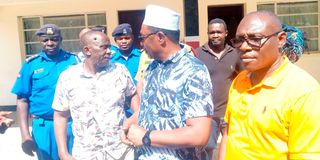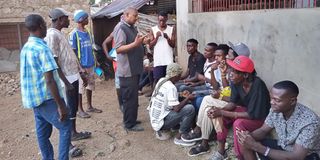Premium
Kisauni, Nyali struck by surge in deadly machete gangs

Kisauni Deputy County Commissioner Jamleck Mbugua, KIsauni MP Rashid Bedzimba and Mtopanga MCA Morgan Masaki after attending a security meeting on November 7, 2022. They issued a warning to the gangs.
Tuesday morning was a normal day for Ann Wavinya as she intended to drop off her child at school and later go to work.
But at around 6.05am, Ms Wavinya, 31, was walking in the Lights area of Kisauni constituency, Mombasa County, when a young man blocked her from the front and grabbed her.
Then another person hit her with a machete in her head.
“It happened so fast,” she recalls. “I just saw blood flowing from my head downwards and within a few seconds my clothes were soaked.”
She says a traffic officer standing a short distance from where the attack happened minded his own business and did not attempt to help.
“My firstborn child was shocked and confused trying to call for help from the cop, but that did not in any way stop the young boys from carrying out their attack,” Ms Wavinya says.
She was cut twice in her head with the machete, sustaining serious injuries.
“Were it not for a Good Samaritan who rushed me to Coast General Teaching and Referral Hospital, only God knows what would have happened to me,” she says.
Ms Wavinya is the latest victim on the list of people who have suffered at the hands of machete-wielding gangs in Mombasa.
On Sunday, the attackers killed a man in Kisauni after robbing him.
But who are these attackers and what are they after?
The gangs comprise people as young as 12 and as old as 26, says Mr Abdallah Abdulrahman, a community policing officer.
“They have their networking skills, as after committing crimes, they are sheltered by their colleagues in different parts within Mombasa and come back again abruptly to strike,” Mr Abdulrahman says.
“They can commit crimes in Likoni and be sheltered in Kisauni or vice versa. We have seen many of them going up to Tanzania, Lamu and Nairobi, then after a short while of one to two months they resurface.”
He explained that such gangsters are usually under the influence of illegal drugs.

Mr Abdallah Abdulrahman, a community policing officer, engages youth in Kisauni constituency on security matters.
But who is to blame?
“These criminal gangs are hotcakes during election periods as politicians use and pay them,” Mr Abdulrahman says.
“They are assigned different duties like pressure groups, mounting posters and even tearing down opponents’ posters, disrupting opponents’ political meetings, and cheering their bosses during campaigns, and they are promised a lot of things by doing that.
“But after elections, the boys are left stranded, their promises remain unmet and because of that, they go back to their wayward and illegal activities with a lot of anger.”
Ms Miriam Bakari, a resident of Mtopanga, says she been forced to rework her daily routine to avoid being targeted
“We have been complaining and we will continue to do so because it seems police officers are not doing their job well. This is why I do not use the same road twice. I have also warned my children of the same,” Ms Bakari says.
The Sunday killing prompted Kisauni MP Rashid Bedzimba and area Deputy County Commissioner Jamleck Mbugua to issue warnings to the gangs.
They blamed parents who neglect their children and thus push them to join machete-wielding gangs.
Mr Abdulrahman says a new criminal gang emerges after every election.
“Like now, we have a gang called Watengwa. There has been Wakali Kwanza, Wakali Wao, Mtu Chee and they keep on changing names or using harsh words like ‘mtajuta kutuzaa’ (you will regret giving birth to us), ‘hawatuezi’, ‘piga ua’, no surrender (attack to kill),” he explains.
Mtopanga, Majengo Mapya, Leisure, Barsheba and Blue Bench are reported to be the new hotspots for such attacks.
The attack on Ms Wavinya was the fifth such case recorded in one week, says Muhuri Rapid Response Officer Francis Auma.
Mr Auma says security officers have not prioritised dealing with the attacks.
"Mombasa residents are now worried. The gangs have made it a habit to attack people in the wee hours of the morning and night. In one week, five cases have been reported and nobody is being arrested. We urge police bosses to intervene on the matter," he said.





